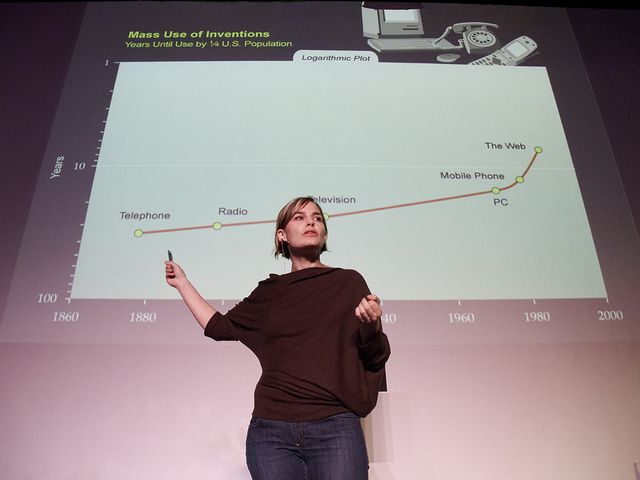Jennifer Pahlka will take a year-long break from running the national civic tech non-profit Code for America to serve as the White House’s latest deputy chief technology officer for government innovation, according to a post on the organization’s blog.
Pahlka founded Code for America, based in San Francisco, in 2009 as a means of pairing savvy technologists with cities that might be having a difficult time breaking into the information age.
Pahlka herself is not a technologist by background or training. She came to tech in the early 1990s by way of the Bronx High School of Science and Yale, where she was an American studies major. She got into the tech conference organizing business, “which was funny because I knew nothing about technology,” she said in a recent interview with me in the non-profit’s gorgeous brick-and-timber headquarters. (Code for America is the subject of a Forefront piece coming this August.)
The first person to occupy Pahlka’s new position, Beth Simone Noveck, was a lawyer appointed in the months following the Obama administration’s groundbreaking memorandum on open government. Noveck was succeeded by Chris Vein, the one-time chief innovation officer of San Francisco, who left the White House for the World Bank in December.
Some wonky info: Noveck’s title was, officially, “deputy CTO for open government.” Vein’s was “deputy CTO for government innovation,” as Pahlka’s will be, and as reflects the fact that the White House has been spinning a bit to figure out exactly what the administration’s leader on “civic tech,” as it’s known, should occupy herself with. But in the few years it has been around, Code for America under Pahlka has clearly caught the eye of Washington.
“Jen and CfA really pioneered the whole idea of tech innovators coming into government to code a better government,” said U.S. CTO Todd Park — Pahlka’s new boss — back in mid-April in an interview for that aforementioned Forefront piece.
Pahlka described what she and her team have been up to at Code for America: “We create an app really quickly, and it works, and people like it. Even if the app isn’t earth-shattering, it has a big impact. It means that people in government go.” At this the 40-something Pahlka screwed up her face and pointed into the distance. “‘Wait a minute, why did we take three years and $3 million to build that thing, when this thing took such a short time and looks better and works better?”
The driving notion behind Code for America, and Pahlka’s last four years, has been that making bureaucracy more efficient, effective and user-centric — in short, making government more like the technology from Silicon Valley that people love to use — can restore a bit of faith in the whole democratic endeavor. “My theory,” she said in our interview, “is that you can start to believe that government can work.”
But whether that approach can work in Washington will be very much her challenge. Pahlka has taken, for sure, a circuitous route to D.C. As a conference organizer, she was intimately involved in the “Gov 2.0” movement that broke into Washington in the early days of the Obama administration but, arguably, failed to change much about how government handles the nuts-and-bolts of creating and acquiring tech. For one thing, “procurement eats innovation for lunch,” said Eric Ries, author of the tech entrepreneur bible The Lean Startup and a Code for America board member. But Pahlka has spent the last years figuring out how to crack open government IT procurement, not least in the course of solving how to free cities to pay for her non-profit’s services.
It’s an experience that she’ll bring to Washington. Add to that the fact that Pahlka is a master convener — Code for America has, in less than a half decade, established itself as the center of gravity in the burgeoning civic tech movement — and it’s not difficult to see why the White House would have an interest in her services. Pahlka seems to know just about everyone in the digital government space. Not a few of them have been Code for America fellows, funders, fundees or have otherwise passed through their space. For a White House that has struggled to get the rest of officialdom to buy into the innovation movement, her powers as a community organizer have a certain appeal.
After all, she’s already sold the White House on her vision. Last spring, the Obama administration unveiled its Presidential Innovation Fellows — “directly inspired,” Park told me, “by Code for America.”
In Pahlka’s absence, CfA will be headed by chief programs officer Bob Sofman and chief of staff Abhi Nemani.

Nancy Scola is a Washington, DC-based journalist whose work tends to focus on the intersections of technology, politics, and public policy. Shortly after returning from Havana she started as a tech reporter at POLITICO.
















